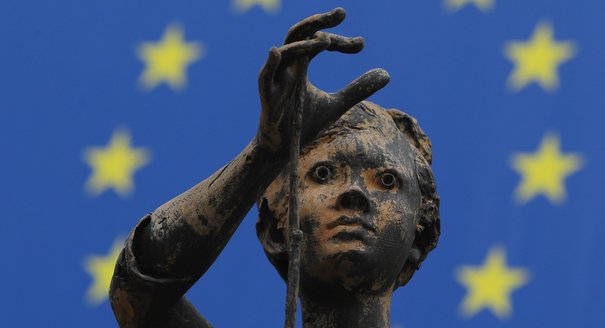People promoting a stronger EU foreign policy usually revert to a single argument. With variations, it is repeated ad nauseam, to the point that eyes tend to glaze over when this old warhorse is trotted out once again.
In brief, it goes like this:
The world is in the midst of a far-reaching redistribution of power. In 1950, the EU’s share of the global population was 15 percent. It now stands at 7 percent, and is likely to drop to around 5 percent by the year 2050.
In terms of its share of global GDP, the EU represented 28 percent in 1950, accounts for 21 percent today, and will probably make up around 18 percent in 2050.
Similar trends are perceptible in many other areas, from military spending to scientific achievements. While Europe’s position remains enviable compared with other parts of the world, its overall weight on the global scales is diminishing, and the ability of European countries—even the bigger ones—to remain relevant players in their own right will inevitably decline. Germany will be the last European state to drop out of the G8, in around 2050.
Europeans, the argument goes, will therefore increasingly be faced with a choice. They can resign themselves to a more modest role on the international stage, accepting that the decisions regarding their neighborhood and the future global order will be taken by others. Or, they can decide to combine their efforts, pool resources, and empower strong common institutions to act on their behalf.
As arguments go, this is not a bad one. It seems logical enough and there is plenty of corroborating evidence. Why, then, does it utterly fail to convince? After all, the facts have been around for years, but real progress in European foreign policy has been elusive.
In the search for the answer to this riddle, there are three major constraints that negate the force of the argument.
The first, seen mainly, but not exclusively, with the traditional great powers, relates to the very nature of foreign policy. Foreign policy is certainly about protecting interests and promoting values, but it is equally about asserting a certain national profile and rank in the world. While collective action in the framework of common institutions can help to promote interests and values, this latter function by definition cannot be shared on the European level.
As long as the role of foreign policy in affirming national identity is highly treasured, there is thus little hope for overcoming the primacy of national foreign policy over a common European policy. Appealing to France and the UK to sacrifice their permanent seats on the UN Security Council in order to make way for a common EU presence is about as realistic as asking them to move the Eiffel Tower and Tower Bridge to Brussels.
The second constraint, particularly in evidence with small and medium-sized member states, arises from the postmodern harmony reigning over much of Europe. Surrounded by friends and facing few security challenges in their immediate neighborhood, many EU member states have simply grown out of the habit of having a serious foreign and security policy. Economic and social challenges and internal security dominate today’s agenda. Diplomacy has been downgraded and military capabilities have been drastically diminished.
Of course, some sort of foreign policy continues, but often as a declaratory exercise preferably without costs and risks. Paradoxically, this virtualization of foreign policy is facilitated by the Common Foreign and Security Policy, which all too often is abused as a forum for collective irresponsibility.
The third constraint results from the long-established habit of relying on U.S. leadership whenever serious security challenges arise. This has led to a deficit of European strategic thinking and an absence of initiative and responsibility. While Washington initially fostered this dependency, it would now prefer a genuine partnership. But the habit is hard to break.
These three constraints together constitute formidable obstacles to an EU foreign policy worthy of the name. They are deeply ingrained, hard to overcome, but also increasingly problematic.
Cultivating the national profile of a global player will not be sustainable if the resource base for such a policy is simply no longer there. Constantly downgrading diplomatic and military capabilities is deeply irresponsible if the neighborhood is in turmoil and the interdependence of the EU’s security with regional and global developments increases. And continuing to rely reflexively on U.S. leadership, when Washington is clearly no longer willing or capable of assuming this role, is downright delusional.
In fact, the argument in favor of an effective EU foreign policy is stronger and more urgent than ever before. It is high time to take it seriously.





.jpg)
